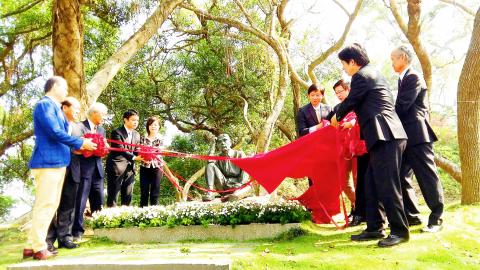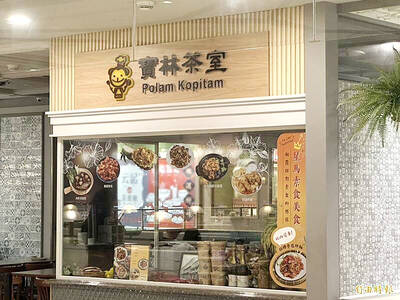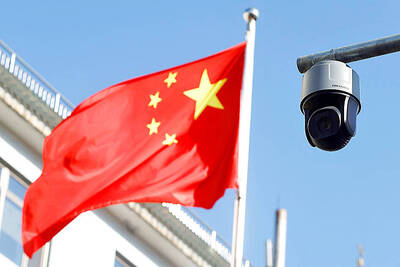Tainan Mayor William Lai (賴清德) yesterday attended the unveiling of a repaired statue of Japanese engineer Yoichi Hatta that was decapitated last month, saying Japan-Taiwan relations are now stronger.
Lai apologized to the Hatta family for the city’s failure to protect the statue and called the decapitation a test that revealed true feelings in both nations.
Members of Hatta’s family, who were also in attendance, thanked the city for its quick repair of the statue and said that Japan-Taiwan ties would not be affected.

Photo: Wang Han-ping, Taipei Times
The statue, located near Tainan’s Wushantou Reservoir (烏山頭水庫), honors Hatta, who is known as the “father of the Chianan Irrigation System” for his contributions to the development of irrigation during the Japanese colonial era.
The statue’s head was removed on April 15, allegedly by former Taipei city councilor Lee Cheng-lung (李承龍), who later told prosecutors he did not agree with the historical status afforded to Hatta.
The Chia-Nan Irrigation Association and the Chi Mei Museum cooperated to repair the statue, opting to use an identical replacement head when the original could not be found.
A commemorative ceremony for Hatta is to be held this afternoon, and is to be attended by his eldest grandson, Shuichi Hatta, and other family members, Japan-Taiwan Exchange Association Director-General Kinzo Nakagun, Kanazawa City Mayor Yukiyoshi Yamano and Kaga City Deputy Mayor Atsushi Kawai.
Association president Yang Ming-feng (楊明風) said the repaired statue would be well-protected and well-monitored with improved lighting and cameras.
“The water shortages we face these days really highlight the importance of Yoichi Hatta’s contributions to irrigation and the Wushantou Reservoir,” Yang said.
Meanwhile, city officials have expressed concern that statues of other historical Japanese figures might come under attack, such as that of Japanese colonial-era Tainan mayor Matao Hatori.
Hatori defied protests from fellow Japanese to reinstate Confucian rituals and repair Chihkan Tower (赤崁樓, formerly Fort Provintia), where a commemorative statue of him was later installed.
The city government requested police to step up patrols at all statue sites, saying that statues of some historical Taiwanese figures, such as Japanese colonial-era lawyer and 228 Incident hero Tang De-Jhang (湯德章) and Republic of China founder Sun Yat-sen (孫中山), might also become targets.
Police said they cannot enter historic sites at will, but have been in touch with Chihkan Tower security guards, advising them to be on the lookout for suspicious people.
One tour guide said statues of historical Japanese figures such as Hatta, Hatori and Goto Shinpei, who served as head of Taiwanese civilian affairs under Japanese rule, are popular among Japanese tourists.
Hatori is particularly notable for his protection of Taiwanese culture and artifacts such as Confucian rituals and the bell at Kaiyuan Temple in Tainan’s North District (北區), the guide said.
Additional reporting by Wang Chieh

POLAM KOPITIAM CASE: Of the two people still in hospital, one has undergone a liver transplant and is improving, while the other is being evaluated for a liver transplant A fourth person has died from bongkrek acid poisoning linked to the Polam Kopitiam (寶林茶室) restaurant in Taipei’s Far Eastern Sogo Xinyi A13 Department Store, the Ministry of Health and Welfare said yesterday, as two other people remain seriously ill in hospital. The first death was reported on March 24. The man had been 39 years old and had eaten at the restaurant on March 22. As more cases of suspected food poisoning involving people who had eaten at the restaurant were reported by hospitals on March 26, the ministry and the Taipei Department of Health launched an investigation. The Food and

The long-awaited Taichung aquarium is expected to open next year after more than a decade of development. The building in Cingshui District (清水) is to feature a large ocean aquarium on the first floor, coral display area on the second floor, a jellyfish tank and Dajia River (大甲溪) basin display on the third, a river estuary display and restaurant on the fourth, and a cafe and garden on the fifth. As it is near Wuci Fishing Port (梧棲漁港), many are expecting the opening of the aquarium to bring more tourism to the harbor. Speaking at the city council on Monday, Taichung City Councilor

A fourth person has died in a food poisoning outbreak linked to the Xinyi (信義) branch of Malaysian restaurant chain Polam Kopitiam (寶林茶室) in Taipei, Deputy Minister of Health and Welfare Victor Wang (王必勝) said on Monday. It was the second fatality in three days, after another was announced on Saturday. The 40-year-old woman experienced multiple organ failure in the early hours on Monday, and the family decided not to undergo emergency resuscitation, Wang said. She initially showed signs of improvement after seeking medical treatment for nausea, vomiting and diarrhea, but her condition worsened due to an infection, he said. Two others who

Taiwanese should be mindful when visiting China, as Beijing in July is likely to tighten the implementation of policies on national security following the introduction of two regulations, a researcher said on Saturday. China on Friday unveiled the regulations governing the law enforcement and judicial activities of national security agencies. They would help crack down on “illegal” and “criminal” activities that Beijing considers to be endangering national security, according to reports by China’s state media. The definition of what constitutes a national security threat in China is vague, Taiwan Thinktank researcher Wu Se-chih (吳瑟致) said. The two procedural regulations are to provide Chinese